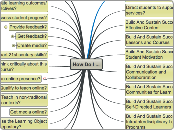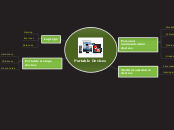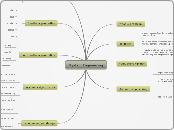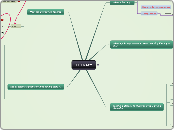How Do I ...
Obey the rules of copyright?
Roll out master course shells?
Use the Learning Object Repostory?
Get media online?
Teach in non-traditonal contexts?
Vocabulary of Non-traditional learning contextsDigital literacyM-learningDVD basediTunes UDistance learningVideo coursesVirtual reality settingsComputer Assisted InstructionComputer Based TrainingRelevant file formatsPopular Web BrowsersDial-Up connections
Qualify to teach online?
Subtopic
Florida Online Academy
Vocabulary of online vs traditionalTraditionalClassroomOn groundFace-to-FaceOnlineBlendedHybrid50/50100% OnlineDistance learning
Build And Sustain SuccessfulCommunity / Business Partnerships
How do I engage the larger community and business orgainzations?
Build And Sustain Successful Intra/Interdisciplinary Learning Programs
Interdisciplinary Programs
Online
Role of Cross-Course Competencies
Set overall outcomes for students (type of person he or she should become)
Seek opportunities to partner across institutions
Seek opportunities to partner across disciplines
Seek opportunities to partner in your discipline
How do I create and sustain....
Interdisciplinary programs?
Intradisciplinary programs?
Build And Sustain Successful Self-Directed Learners
Although "Building and Sustaining Successful Communities for Learning" is not a prerequisite, familiarity with that module may be helpful.
Self-Directed Learning
Intervene appropriately
Monitor progress without interfering
Be open to new ideas
Provide expert assistance
Use Problem Based Learning
Set the parameters and expectations
Encourage Exploration and Discovery
Structure Self-Directed Projects
Explain your role to students
How do I enable and support self-directed learners?
Problem based learning
Exploratory learning
Clear expectations
Competencies
Build And Sustain Successful Communities for Learning
Although "Building and Sustaining Successful Communication and Collaboration" is not a prerequisite, familiarity with that module may be helpful.
Building community
Apply Maslow's hierarchy
Apply student feedback
Maintain scholarly civility
Promote displays of diversity
Accept displays of multiple intelligences
Build safe environments for learning
How do I nurture and sustain learning communities?
Collaborative assignments
Build And Sustain Successful Communication and Collaboraration
Although "Building and Sustaining Successful Effective Content" is not a prerequisite, familiarity with that module may be helpful.
Communicating and Collaborating
The Concept of Presence
Professor Avatar
Engineering your online persona
Understand uses of different communication channels
Distinguish carefully between cheating and collaborating
Apply social learning theory
Build safe environments
Create opportunities for collaboration
Partner with students
Use Groups
Evaluate if students are ready for cooperative learning
How do I get my students communicating and collaborating?
Elluminate
Chat?
Groups
Discussions
Build And Sustain Successful Student Motivation
Preassessments
Icebreaker activities
Sustanining student success
Discussion
Most of our students are adults. In this course, we based our guidelines for coaching on Knowles's principles of andragogy. Andragogy studies how adults learn, as contrasted with pedagogy which studies how children learn. How to you respond to the proposition that treating your students as adults should increase student success?
A perennial problem in online classes is students who are not ready for online learning. They may not have the technology needed, the technical skills or the time management skills (among other lacks). How should colleges address this problem? What do you think of our Readiness Survey?
What media do you allow students to use when submiting projects? Can they get credit for video, audio, graphics files, for example? Why or why not?
Non-traditional contexts
Use of Question banks
Use on online Quizzes
Use of a Dropbox
Assist with LMS usage
Use of automated quizzes
Use of Glossary
Use of FAQ
On ground
Assessing student readiness
Where on the competency matrix?
Emotional readiness
Existing knowledge
Apply Andragogy
Andragogy makes the following assumptions about the design of learning:
(1) Adults need to know why they need to learn something
(2) Adults need to learn experientially,
(3) Adults approach learning as problem-solving, and
(4) Adults learn best when the topic is of immediate value.
Motivating
Evaluate and share
Evaluate if students know enough to go forward, Share why you are excited by the subject, Apply andragogy, act as coach, stimulate positive emotions, provide clear guidance, give positive feedback, encourage good work, praise good interaction with other students, stress academic integrity, using scaffolding and modeling, build on brain-based learning systems, listen to student feedback
Invoke the emotional learning system.
Intrinsic vs. Extrinsic Motivation
Our focus here is Stage 2 Teaching and Learning
Brain-based learning systems
Using your lesson outline or your lesson chart, label each part of the lesson as to the Theater of the Mind in which it belongs. If there are missing theaters, write suggestions for ways to include them in an online course.
Modes of Learning
Given one of the objectives you have already written, write a paragraph explaining how you could use Modes of Learning to teach that objective, progressing from short term memory to integrating the learning into long term mental schemas.
You have advanced education in a subject other than education. Reflect on that. Have you achieved a state of Reflective Competence?
For each of the online learning system tools listed below, place your self in the Competency Matrix.
Andragogy (explain why)
For two objectives, write a brief summary explaining to your adult learners why they should master each objective.
How do I ....
Keep my students motivated?
Reveal my motivations
Share enthusiasm
Get my students motivated?
Use etech
Treat studennts as adults.
Engage emotions
Build And Sustain SuccessfulLessons and Courses
See "How do I create media?"
Modules and Lessons vs Other Structures
Control vs Any time access
Customization vs. Consistency
Sequencing vs Not sequencing materials
Performance Objectives
OR Post it in the Discussion Board
For a course with which you are familiar, analyze four of its stated objectives in terms of the the ABCD model. Record your analysis on the following table and post it in your practice course. Post it in the discussion board.
Bloom's Taxonomy
Vocabulary of Bloom's Taxonomy
Match a description of each level to the name of the level.
For your subject area, write or find and copy one objective for each of the levels in Bloom's taxonomy using a suggested verb from the relevant list
How do I structure effective lessons and courses?
Course Rubrics
Assessments
HTML Editor
Content
Build And Sustain Successful Effective Content
Course management techniques
Relevant college policies and expectations
Effective Content
In other contexts
Online
On the ground
Maintaining content over time
Update and refresh content
Publish your preferred means of contact
Publish your office hours
Stress academic integrity
Provide accommodation statement
State the learning objectives
Publishing syllabus online
Engaging the Senses and the Emotions
21st Century Students
Writing for electronic media
Presentation pointers
Optimizing media for web delivery
Accessible
Multi-sensory
Inverted Pyramid
Varying media for learning styles
VARK Learning Styles
SSDL mode (Staged Self-Directed Learning)
Content is not enough, necessary but not sufficient
Our focus here is Stage 0 Teaching and Learning
Tell them
What you told them
What you want to tell them
What your are going to tell them
Kolb's Learning Styles and Lesson Structure
Given one of the objectives you have already written, create a chart illustrating how you would teach that objective going round the circle.Is your chart more appropriate for onground or online training? How would you change it for use in the other environment?
Given one of the objectives you have already written, outline a lesson that uses multiple senses and student activities.a. Label each part of the lesson with the sense or senses invoked.b. Label each part of the lesson with the appropriate learning style from the VARK list.
How do I produce effective content?
Learning Object Repository
Copy course components
Manage content
Manage files
Direct students to support services?
Know about:
On ground student orientation
Online student orientation
IT/Florida Online Technical Support
Technical support for online faculty
Academic Support Center
Instructional support for online faculty
Faculty Center (to be named later)
Florida Online FAQs
Florida Online Tool Technology Library
Orientation to How Do I Build And SustainSucessful (BASS) Learning Environments?
Challenges Of Online Learning
Using the online learning environment
Assessing Learning
Modules and Lessons
Using Social Media
Managing Email
Managing Discussions
Creating Personas
The persona of the instrutor is the instructor that exists in the mind of the student in an online course. This instructior persona is built up based on the introductions, texts, documents, media, feedback, assessments, interaction, interventions, and other elemnets presented online by the actual instructor. This persona may be like or unlike the actual instructor if encounterd face-to-face.
Whether the instructor consciously crafts an online persona or not, the instructor needs to be where that such a persona is always created in the students's minds.
In order to "just be yourself" online, you must make choices that let your self be revealed online.
Building Community
Educational Technologies Overview
Learning Theories Overview
Brain-Based Learning Strategies
3 Networks
5 Theaters
Andragogical Strategies
Technology Mediated Instructional Procedures
Learner-centered Approaches
Teacher-Centered Approaches
Cognitive Learning System
VARK
Kinesthetic
Reading (Visual: Verbal)
Auditory: Verbal
Visual: Non-Verbal
Competency Matrix
Reflective Comptence
Uncoscious Competence
Conscious Competence
Consciouis Incompetence
Unconcious Incompetence
Modified Self-Directed Learning Model
Teaching as Mentoring
Teaching as Conslting
Teaching as Fostering Community
Teaching Collaborating
Teaching as Coaching
Teaching as Presenting
Continuum of Instructor / Student Control
The Points System
Tool Resource Library
Building and Maintaining Learning Environments
How do I get through this Academy?
Maintain an online presence?
Think critically about this course?
Heterodoxy
How do I respond to Atherton's critiques of what we've been studying?
Impart 21st century skills?
21st century skills Mike Moore's note: teach componentsDevelop/define targeted business/industry profiles for entry level staff/personnel
Collaboration and teamwork
Critical thinking
Graphical literacy
Beware the big block of text.
Graphs and charts
Infographics
Digital literacy
Inspire life-long learning
Make expert learners
Create media?
Accessability
Video production
Scripts
Celtx
Flolrida Online Request form
Lecture Capture
Screen capture
CamStudio
Camtasia
Captivate
PowerPoint
Adobe Presenter
Articulate
iSpring
Google Docs
OpenOffice
Image capture
Wisdom Soft
Snag-It
Jing
Image sources
Get feedback?
Quality Control Processses
Get feedback from students
End of course feedback survey
Lesson ratings and feedback
Discussion ratings
Consult your eMentor
Analyze a course
Analyze a course in terms ofthe rubrics provided by the collegethe applicable stage(s) of the SSDL modelthe community building and maintaining aspects of the courseusing Maslow's hierarchy of needs?its coverage of the VARK learning stylesits coverage of the 5 brain-based learning systemsits accessibilityits accommodation of multiple intelligencesalignment of assessments to objectives
Course rubrics
eMentors
End of Course survey
Lesson Feedback tool
If we use this, it will also help the instructors use it in their course, they can view course feed back at the course level. Instructors can go to the Content and on the Reports icon, they can find the course Feedback.
Discussion posts
Provide feedback?
Course Mail
Quizz feedback
Discussion feedback
Dropbox feedback
Assess student progess?
Assess collaborative assignments in online environments
Assess student produced mediaVideoAudioPowerpoints
Beyond the Muliple choice test.
Objectives
Progress
Time spent
Competencies?
Quizzes
Discussion Assessments
Dropbox
Create learning outcomes/objectives?
Communicate Requirements?
Classlist
Discussion Posts
Syllabus
Schedule
News
Take Attendance?
Best practices
School requirements
Relevant tools
Attendance?
Syllabus Quiz
Icebreaker









